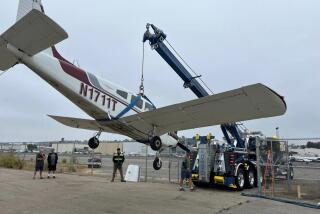Traces of Cocaine Found in Pilot of Plane That Crashed, Killing Nine
- Share via
WASHINGTON — The pilot of the Continental Express commuter plane that crashed in January near Durango, Colo., killing nine people, had traces of cocaine in his urine and evidence of the drug’s by-products in his blood, the National Transportation Safety Board reported Friday.
Aviation officials said they were not aware of any previous accidents involving U.S. commercial airlines in which evidence of drug use by pilots had been found.
The board did not characterize the finding as a cause of the accident or indicate whether the pilot, Steven S. Silver, 36, might have been impaired. Investigators have not determined whether the pilot or co-pilot was flying the airplane at the time of the accident.
Both crew members were among the nine people who died in the Jan. 19 crash. Eight survivors were rescued after one of them, Peter Schauer, trudged 1 1/2 miles over a snowy mountainside to a house.
Not Under Influence
Dr. Sorell L. Schwartz, a pharmacology professor at Georgetown University, said that based on the amounts of the traces found, the pilot was not under the influence of cocaine at the time of the accident.
Schwartz also said it was unlikely that a habitual user of the drug would feel any lingering effects from the amounts of cocaine detected in the pilot’s body.
“There can be impairments,” he said. “There can be impaired mental function, but that’s not usual.”
Safety board spokesman Alan Pollock refused to characterize the findings.
“This investigation continues, and has quite a long way to go,” Pollock said. “We don’t expect to find a probable cause for a number of months.”
He noted that investigators have not determined whether Silver was operating the twin-engine turboprop aircraft when it crashed about 10 miles east of Durango.
Tests on Co-Pilot
Test results on the co-pilot, Ralph Harvey, 42, are expected in about two weeks, Pollock said.
The tests showed that Silver’s blood contained 22 nanograms per milliliter of benzoylecgonine, a byproduct of the body’s breakdown of cocaine. A nanogram is one-billionth of a gram.
Silver’s urine contained the same amount of cocaine, and 1,800 nanograms per milliliter of the byproduct. No other drugs were detected.
Silver was an employee of Trans-Colorado Airlines Inc. of Colorado Springs, which leases planes and crews to Rocky Mountain Airways, a Continental Airlines subsidiary that operates in Colorado as Continental Express.
Pilots’ Group ‘Disturbed’
The Air Line Pilots Assn. said it was “deeply disturbed” by the report and added that “this would be the first instance where drug use by a pilot was shown to be the cause of an accident at a U.S.-scheduled airline.”
George James, president of Airline Economics Inc., a Washington consulting firm to the airline industry, said he was not aware of another commercial airline accident in which drug use had been involved.
“I’ve spent 22 years in the business now, and I have not” heard of another case, he said.
The Transportation Department on Thursday proposed a drug testing program for more than a half million airline employees.
More to Read
Sign up for Essential California
The most important California stories and recommendations in your inbox every morning.
You may occasionally receive promotional content from the Los Angeles Times.













